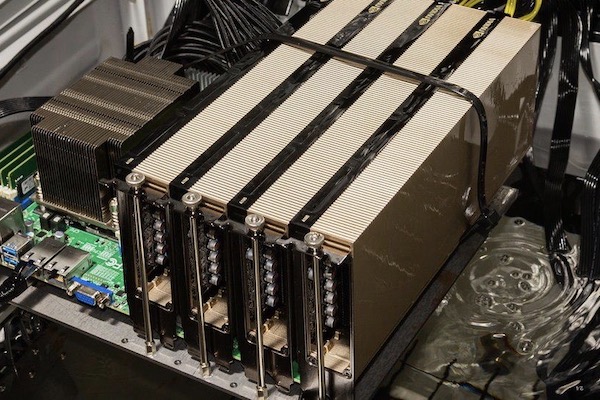Published on the 23/03/2023 | Written by Heather Wright

Data centre sideline business sees resurgence…
While Microsoft might be dreaming of data centres under the sea, a British company has installed a data centre at a swimming pool centre, using the waste heat to warm the pool.
Deep Green, a UK data centre startup, implemented a small Edge data centre in the Devon leisure centre, where it is expected to save the leisure centre £20,000 in heating costs and cut carbon emissions by 25.8 tons annually. The bonus for Deep Green is it doesn’t have to pay for expensive cooling systems for the data centre.
Five years in development, the 28kW system – about the size of a washing machine – uses computers immersed in oil which captures the heat. The oil is then passed through a heat exchanger, transferring the heat into the pool.
“Deep Green is transferring 96 percent of the energy used by its computers.”
Deep Green says the current installed system, which runs a High Performance Computing cluster providing compute power for AI and machine learning to customers, can heat the pool to around 30 degrees Celsius for around 60 percent of the time. It says it’s transferring 96 percent of the energy used by its computers.
The company has seven more pools in across the UK signed up and has set a target of 20 locations in 2023.
Deep Green isn’t alone in its efforts to harness data centre heat for practical benefits. Companies around the world have been attempting to find more efficient ways of cooling data centres and managing heat they produce.
A recent report from global engineering company Danfoss estimated that the EU wastes 2,860 terawatts of excess heat a year, including from data centres. That’s only marginally less than the 3,180TWh required for heat and hot water across the EU and UK.
Just a few years back, digital boilers seemed a hot market, with plenty of money flowing into the sector. Then the market appeared to cool off – or at least quieten down as the hype of a novel idea ran into practical realities.
A Dutch company attempting a similar solution, Nerdalize, declared bankruptcy in 2019, while the US’s Exergy also disappeared. Germany’s Cloud&Heat, meanwhile, has transferred its attentions to creating efficient edge data centres.
Security concerns with the data centres located in private locations; scaling, with even a very large apartment block not needing the amounts of hot water or heating provided by a larger data centre; and the need for data centres to operate 24×7 when heating isn’t required around the clock 365 days of the year are key issues. The cost and challenges of getting the heat into the local system is also a challenge – one that Deep Green is bypassing by putting the data centre at the site where the heat is required.
But the digital boiler market hasn’t gone completely off the boil as Deep Green’s work shows.
France’s Qarnot, which recently closed a €35 million financing round, has been tapping into the problem for years building a business which not only sells the compute facilities, but the power as well.
The company, launched in 2010, uses a system which heats water using the waste heat. It installs servers directly in buildings such as housing, offices, schools and logistics warehouses, where the waste heat is recovered.
Qarnot says it has deployed 100 units of the digital boilers – totalling around 70,000 HPC cores – at 25 sites in France and Finland.
Its boilers run 24/7 for hot water rather than just heating.
Qarnot has plans for several data centres in Europe and has rolled out a small pilot data centre in Finland with 100kW of compute. It has also partnered with a Dutch company, Asperitas, to provide a water-cooled, oil-immersion system.
Nordic regions in particular have embraced the use of data centres to power homes for more than a decade, with schemes underway in countries including Denmark and Sweden. In Denmark a Facebook data centre’s excess heat was being used to warm nearly 7,000 nearby homes, while fashion retailer H&M began recycling its waste heat to nearby homes back in 2013.
In Finland, waste heat from two new Microsoft data centres will be captured and used in a district heating system.
As for Deep Green, it says around 30 percent of industrial and commercial heat demand could be met by its technology.



























